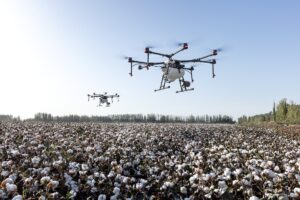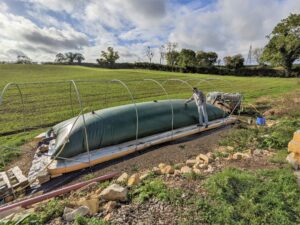The Future of Agricultural Technology (AgriTech): An Overview

From 1961-2018, cereal output increased by 330% and meat production by 480%, while agricultural land only increased by 7%. This can be attributed to many factors but chief among them would likely be the 600% increase in fertiliser use, as well as increased pesticide use.
There is growing evidence that prevailing agricultural practices are endangering the future of agriculture. Growing populations, climate change, and water scarcity are making it more difficult to grow enough food for all, especially in extreme environments. With these challenges in mind, the future of agriculture must utilise new technology such as AI, robots, and other modern sensors and systems to ensure sustainable practices in the long term.
With the UN Secretary-General claiming that we are “tremendously off-track”[1] to meet Sustainable Development Goals (including those encompassing agrifood), how are new technologies aiming to address sustainable agriculture in the future?
In the following article, we aim to answer some of these questions, while providing examples of AgriTech companies involved and their technologies that are shaping the future of agriculture.
The future of agriculture depends on incorporating emerging tech
Climate change continues to be linked directly with increasing CO2 emissions, 34% of which come from agrifood systems globally. Global warming has a profound impact on agriculture, affecting crop yields, water availability, and pest patterns. It is evident therefore that farmers and cultivators will have an increasing reliance on technology in the decades to come – which opens the door for a new agriculture – agriculture 4.0. Climate monitoring involves the use of advanced sensors, satellites, and data analytics to gather real-time information about weather patterns, temperature, humidity, and other environmental factors.

7 Innovative companies that are at the forefront of the agritech future
Ignitia’s Climate Intelligence solution sends meteorological information directly to farmers so they can make important decisions about soil preparation, sowing, weeding, etc. This data can also help farmers make informed decisions regarding irrigation, and pest control, as well as informing predictive models to better anticipate weather changes.
Bountiful pairs weather analysis with satellite imagery to produce yield forecasts with the help of machine learning. This enables farmers to adapt their practices and mitigate potential risks, ultimately improving crop yields and sustainability.
Traditional pesticide use has raised concerns about its environmental impact, including effects on non-target species and the development of pesticide-resistant pests. Furthermore, a paper published in 2022 estimated that there were around 385 million cases of unintentional acute pesticide poisonings per year. To address these challenges and ensure sustainable agriculture practices in the future, companies are focusing on developing alternatives to chemical pesticides, using techniques such as biological control (using natural predators), pheromone-based traps, and precision spraying.
Pherosyn is one such company, that develops high-quality pheromones for particular insect species affecting crops including peas, pears, and cereals. Pheromones are secreted by an organism and sensed by another of the same species, triggering a social reaction or behavioural change. This can be used to raise an alarm, or encourage reproduction or feeding at a specific time or location. When Pherosyn’s pheromones are released, the pests are attracted and can be trapped, allowing farmers to assess the extent of infestation, and localise the use of pest control.
For the precision administration of insecticides and fungicides, Hydroemission have engineered a precision delivery and controlled release technology. By encapsulating both pesticides and fertilisers into a biodegradable matrix, the active ingredients can be released directly into the xylem or phloem (the plant’s internal transport systems) for efficient and effective transport to the leaves and other parts of the plant, attacked by pests. This increases the local concentration of pesticides and fertilisers, while reducing the risk of the pesticides being diluted by rain. Strategic Allies Ltd has produced Technology Spotlights for both Pherosyn and Hydroemission.
Agricultural waste streams, such as crop residues, straw, and husks, are often considered a problem due to their disposal challenges and potential environmental impact. However, novel technology allows farmers to embrace the concept of upcycling, i.e. converting agricultural waste into valuable resources. This waste can be used to produce biofuels, bioplastics, and even high-nutrient animal feed. According to Straw Innovations, 750 million tonnes of rice straw is produced each year, with nearly half of it burned for disposal. Worse still, much of the rest is left to rot in the fields where they grew, releasing climate-damaging methane. Straw Innovations have therefore designed modifications to combine harvesters to collect both the rice and the straw during the harvest. From there, the straw can be upcycled to feed livestock, mushroom production and create bioenergy. To this last point, it is sometimes assumed that anaerobic (without oxygen) digestion of agricultural waste can only be carried out at large, purpose-built facilities.
EcoNomad Solutions have challenged this presumption by creating a modular and scalable waste-to-energy solution, that can be applied to small farms, micro-dairies, and animal sanctuaries. Organic matter is broken down by microorganisms in the system to release methane, which can be used for cooking, water heating, and energy generation.

Strategic Allies Ltd has further information about both of these companies in the Technology Spotlights section of our website. By upcycling these materials, companies not only reduce waste but also create additional revenue streams, contributing to a circular economy and a sustainable agriculture future.
Finally, plant seed innovations are imperative now more than ever as they offer solutions to critical challenges facing agriculture today, including increasing occurrences of extreme weather, nutrient-poor agricultural land, and explosions in invasive pest populations.
Indigo Agriculture understand that today’s crops have a far smaller microbiome protecting them than their wild crop ancestors. They therefore set out to sample wild crops globally and, using bioinformatic tools, have developed seed treatments consisting of bacteria and fungi that can improve the germination of seeds. These microbes help shield the seeds from tough conditions and improve the yield of crops, while decreasing inputs such as fertilisers and pesticides.
Conclusion
Agricultural technologies, or AgriTech, are going to be a big part of the future of agriculture. We covered only a small selection of areas of agriculture that will continue to see agritech innovation in the future, with others including aquaculture, emissions assessments, use of freshwater, precision agriculture, and genetic engineering. Large companies are already investing heavily in this space such as Syngenta who pledged $2 billion of budget in 2019, over the five following years to support innovations in agricultural sustainability. Elsewhere, Cargill are working in partnership with ZELP to trial wearables for livestock that capture the methane, released from cattle, before it can enter the atmosphere.
Strategic Allies Ltd have previously worked with such companies, such as an ingredient’s manufacturer operating a number of large-scale organic farms, in order to help them innovate. We helped them find technologies including robotic solutions, thermal methods, spot spraying systems, and new herbicide formulations that comply with organic standards, allelopathy and regenerative practices, in order to manage weeds (see case study here).
In the future, AgriTech will be used to improve the sustainability of our farming practices, but also to increase the rate of unsustainable farming, harming the planet further. It is up to industry leaders to strive towards the former of the two possibilities, and Strategic Allies Ltd is here to help you find sustainable innovation partners. Whether you are searching for ways to reduce agricultural waste, reduce reliance on fertilisers and pesticides, better understand how climate change may affect the future of your crops, or any other aspect of AgriTech, Strategic Allies Ltd will work with you to find optimal solutions.
References
- https://www.un.org/sustainabledevelopment/blog/2021/07/tremendously-off-track-to-meet-2030-sdgs-un-chief/
- https://bmcpublichealth.biomedcentral.com/articles/10.1186/s12889-020-09939-0